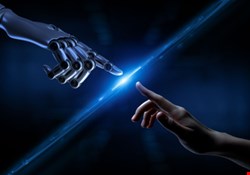
Imagine standing on a pristine beach, toes buried in the sand, watching as waves rhythmically crest and recede against the shoreline. Now imagine that, in the blink of an AI, the tranquility is shattered by a colossal tsunami (or should I say tsunamAI) wave racing toward you. That is how rapidly and comprehensively artificial intelligence (AI) is set to change the world – it is an unstoppable force transforming every sphere of human life – and nowhere is this transformative potential of AI more evident than in the field of cybersecurity.
AI is no ordinary wave. It will make the step-changes caused by the introduction of the internet or the smartphone seem slow and minor. Those inventions took years to catch on and initially, allowed billions to opt out. By contrast, AI will sweep across the planet in less than a year, changing the patterns in the daily lives of us all.
This is a ‘meta-wave,’ one that creates and changes the very nature of other waves. In this context, AI is a meta-invention, a groundbreaking human achievement that generates and redefines other inventions. In other words, AI is not just an invention; it is the mother of future inventions and promises to be bigger than anything we have ever seen.
How might we expect this to impact the world of cybersecurity?
For the longest time, cybersecurity has been a game of cat and mouse, where criminals and nation-state espionage lead the way in creating threats, and infosec professionals follow as quickly as possible with the solutions.
In the short term, we can expect to see a massive increase in attempts to subvert AI into traditional methods of cybercrime:
- Automated and wide-scale spear phishing attacks, using interaction and resources at a scale we have not experienced before.
- The collapse of certain security authentication techniques. For example, AI is already proving able to fool voice authentication.
- Increased insider threats at work, such as customer service transitions to AI and people feeling disenfranchised by technology.
- The possibility of a complete corporate hijack. As AI tools become more accessible, within months, it should be possible for a criminal or nation-state to map and coordinate a remote takeover of organizations that have, on one side, a vast amount of automation and, on the other, a considerable number of unresolved vulnerabilities.
As an example of the magnitude of the wave, according to research in my recent book, Artificial Intelligence for Beginners, some 12% of the global workforce are currently employed in customer service. The capabilities of AI make it probable that most of these roles will disappear over the next 12 months. Consider the impacts of this single change on those individuals and the societal and corporate landscapes.
How would the displacement of large numbers of employees, including some working in cybersecurity functions, impact your organization?
In the long term, the AI meta-wave is expected to entirely restructure the cybersecurity landscape. Advanced AI solutions will revolutionize how we detect, respond to and prevent cyber threats. By leveraging machine learning algorithms, AI can learn from historical cyber-attack data, predict future attack vectors and even develop its own countermeasures. This could lead to a scenario where AI increasingly drives cybersecurity measures, with human oversight gradually taking a backseat.
This seismic shift in the cybersecurity paradigm raises a new set of concerns. We must be vigilant against the risks of over-reliance on AI, the potential biases in AI decision-making and the inherent unpredictability of AI’s self-learning mechanisms. The challenges for cybersecurity professionals will change from a primarily technical battlefield to an increasingly ethical and managerial one, forcing a redefinition of roles and responsibilities. It will no longer be sufficient to be technologically adept; future cybersecurity professionals will need to grapple with the philosophical and ethical dimensions of AI.
Facing this AI meta-wave, what then should be our response? How can we, as individuals and as a society, navigate this unpredictable and potentially overwhelming scenario? Do we simply surrender to this transformative force or strive to channel and shape it to our advantage?
The answer may exist in acknowledging the power and potential of AI but also recognizing our own role and power to decide how we engage with this meta-wave. While AI will undeniably bring about transformative changes in all aspects of our lives, we have the power to decide how we use our time and resources to shape our own slice of this new reality.
We can choose to leverage AI to enhance our skills and augment our capabilities rather than viewing it as a threat to our professional identities. As cybersecurity professionals, we can use AI to help us better predict and combat cyber threats and preserve digital trust while remaining vigilant to its potential risks and pitfalls.
As individuals, we can embrace the benefits of AI in our everyday lives while remaining mindful of its impacts on our privacy, autonomy and social interactions. We can seek to understand how AI works and make informed decisions about the AI services and tools we use.
As a society, we must engage in thoughtful and inclusive discussions about how AI should be developed and regulated. We should strive for a balance between harnessing the benefits of AI and mitigating its risks. This includes creating ethical guidelines for AI use, ensuring transparency and accountability in AI systems and promoting digital literacy among the public.
Preparing for the AI meta-wave is not just about bracing for impact; it is about actively participating in shaping this transformative force. It is about recognizing that although AI is a powerful meta-invention, we are not powerless. It is about understanding that the best way to predict the future is to create it.
So, how are you preparing for the meta-wave?
